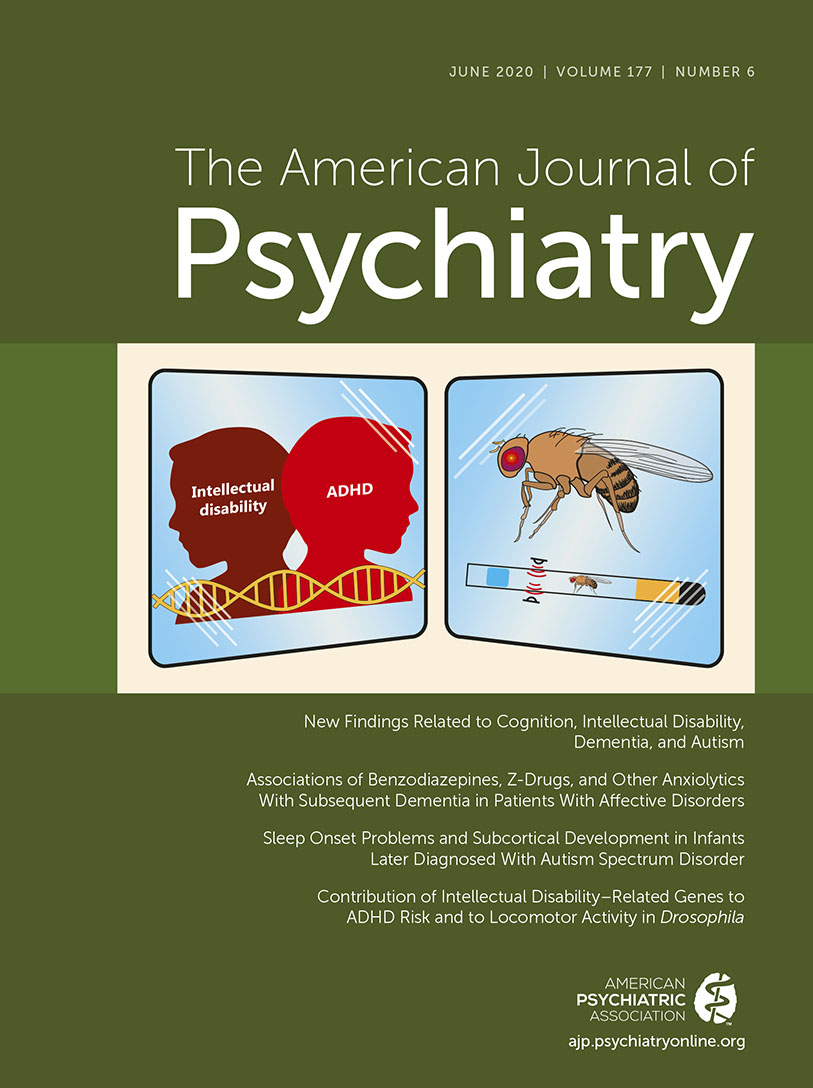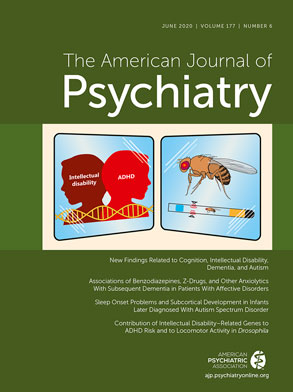There has been increasing concern that therapeutic use of the benzodiazepine class of anxiolytics may predispose to or even cause Alzheimer’s disease after chronic use. It has been known for many years that all benzodiazepines, like other sedative-hypnotic drugs, can interfere with memory functions (
1). Clinical experience (
2) as well as a retrospective meta-analysis (
3) suggest that any related memory impairment is primarily recent recall and is often mild and largely reversible when benzodiazepines are discontinued (
4). These effects of benzodiazepines may be due to interference in usual GABA
A-benzodiazepine chloride ionophore function or to individual sensitivity to these drugs, especially in elderly individuals who may be more susceptible to these side effects.
The question of benzodiazepines causing dementia was first raised by Gallacher et al. (
5), who noted that men in earlier phases of dementia showed an association with taking benzodiazepines; however, the authors also noted that they “failed to demonstrate a dose–response effect with drug duration.” Current, widespread medical and public concern regarding benzodiazepines and Alzheimer’s disease was more recently aroused by a report of a causal relationship between long-term (>3 months) benzodiazepine use and the development of dementia (
6). A central criticism of this study questioned the validity of the Alzheimer’s diagnoses because they were inferred from the use of drugs usually given to patients with Alzheimer’s; no subjects were interviewed, and no diagnostic tests were performed. There was also no control for prior or present health status, alcohol or substance use, or even benzodiazepine dose. It is even possible that some subjects already had cortical evidence of either mild cognitive impairment or impending Alzheimer’s disease before they started taking a benzodiazepine although they did not present with obvious clinical symptoms (
7,
8).
Two other case-control retrospective studies, however, demonstrated the opposite conclusion that the effect of benzodiazepines on cognition was small and not clinically significant (
9,
10). A subsequent prospective population-based study also revealed “no evidence of a causal association between benzodiazepine use and dementia (
11). Based on a review of these studies, two separate opinions declared that benzodiazepine use does not cause dementia (
12,
13).
In this issue of the
Journal, Danish researchers Osler and Jørgensen (
14) report that a “large cohort study did not reveal associations between use of benzodiazepines or Z-drugs and subsequent dementia, even when exposures were cumulated or divided into long- and short-acting drugs.” Their large case-controlled survey carefully identified a sample of individuals who had “any use” of benzodiazepines (and Z-drugs) over a decade. Prescription data and valid patient diagnostic information were used to assess any possible association between benzodiazepine use and the development of dementia. Covariates eliminated factors that might affect the conclusions (e.g., alcohol and substance use, other psychiatric drugs, and sociodemographic variables). The authors, who are well known in the field, concluded that there is no evidence to support the association between benzodiazepine use (and Z-drugs) and the development of dementia. They even added: “Some results were compatible with a protective effect.”
Thus, the preponderance of data available to date do not support a causal relationship between low therapeutic benzodiazepine use and the development of Alzheimer’s or other dementias, despite the well-known mild and reversible memory impairment associated with benzodiazepine doses that occurs in some individuals. How are we to understand the earlier findings that suggest a significant public health concern regarding the safety of benzodiazepine use, especially in those who are aging and in the elderly?
Memory decline is anxiety provoking as those in middle age begin to experience difficulty remembering names or recent events. This experience, originally called age-associated memory impairment, is now termed mild cognitive impairment. Although approximately 80% of those with mild cognitive impairment do not progress to a diagnosable dementia, such as Alzheimer’s disease (
15), anxiety over memory decline is common (“senior moments”) and can interfere with quality of life and sleep. Kaiser et al. (
16) hypothesized that men in midlife who are still highly functional may have insight into their age-related memory problems and become anxious about their capacity as breadwinners with family responsibilities. This anxiety is probably common in today’s world and was illustrated in a 2016 cartoon in the
New Yorker showing two well-dressed businessmen talking on a New York City street. One says to the other, “I’m glad to hear you say that, I can’t remember your name either.” One possibility might be that some people start taking a benzodiazepine to alleviate the anxiety about memory decline and their worry about impending Alzheimer’s disease.
In the elderly, mild cognitive impairment may also be treated with low-dose benzodiazepines to improve daytime calming (as well as sleep onset), and this use may be welcomed. For example, in a small nursing home study (
17), anterograde amnesia in nondemented very elderly residents disappeared when benzodiazepines were gradually tapered and discontinued. However, those elderly residents whose memory improved after benzodiazepines were stopped strongly preferred to continue their medication for the calming and sedative effects and did not mind mild recent memory impairment.
It is interesting to speculate on the possible neuroprotective effect of benzodiazepines as individuals age, despite the small and mostly reversible neurocognitive side effects. Anxiety may be a marker of prodromal Alzheimer’s disease in patients with mild cognitive impairment. Anxiety is said to be higher in early-onset Alzheimer’s disease than in later-onset Alzheimer’s, especially in men (
18). Stress is associated with increased CNS cortisol that may, over time, contribute to cognitive impairment and possible Alzheimer’s disease development (
19). Two studies of midlife stress in women showed an association with later development of both early- and late-onset dementia (
20,
21). It is conceivable, therefore, that the calming effect (and sleep onset hypnotic effect as well) of low-dose benzodiazepine use in elderly people with anxiety may reduce the effects of stress on the aging CNS and reduce the risk of vulnerability for the development of Alzheimer disease.
Experienced geriatric clinicians often find that judicious use of low-dose short half-life benzodiazepines reduces stress, promotes daytime functioning, and assists in sleep onset (
22). As noted, some very elderly individuals state that they would gladly forgo short-term memory reduction in exchange for a calmer daytime and reliable sleep onset.
How do these studies affect care of the elderly? There is little doubt that benzodiazepines, like other sedative hypnotics, may be associated with impaired cognition, usually mild, in a dose-dependent fashion. Usual recommendations are for the use of only short half-life benzodiazepines at low doses and, if clinically possible, for brief periods of time (
23). We will await future studies regarding benzodiazepine’s (and other medications) possible associations with the development of late-life cognitive disorders. Until then, we must assume that appropriate use of benzodiazepines will not lead to the development of Alzheimer’s disease.
Acknowledgments
The author thanks Dr. Richard I. Shader, who contributed to the preparation of this editorial.

